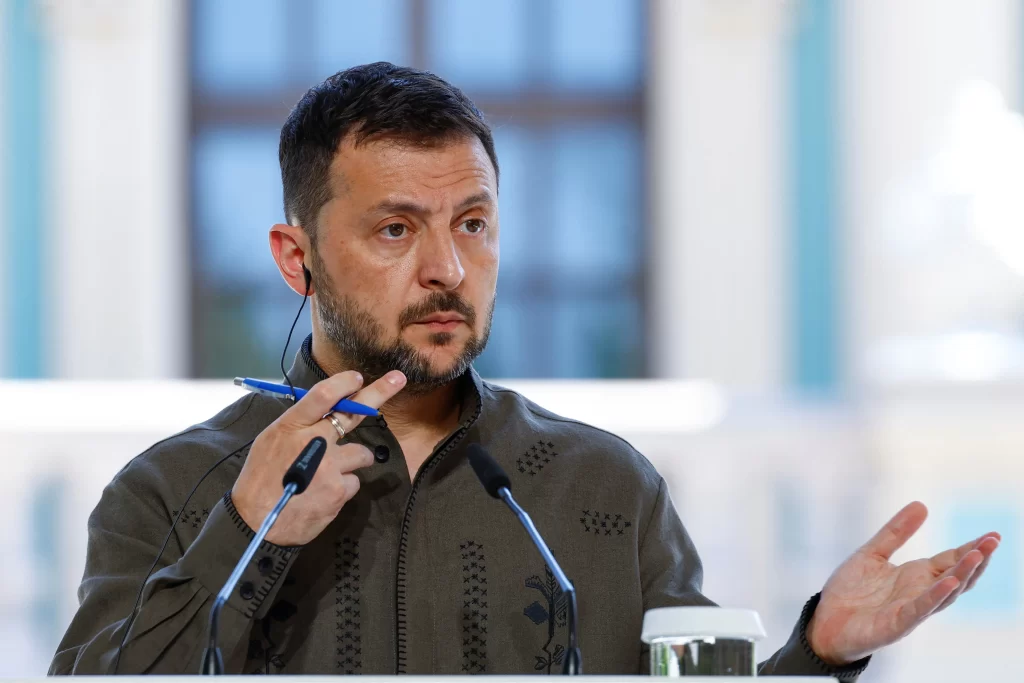KYIV, Ukraine — In a bold Independence Day address, Ukrainian President Volodymyr Zelensky mocked Russian President Vladimir Putin as a “sick old man” and pledged to continue military operations on Russian soil, defying nuclear threats from Moscow.
Speaking on the thirty-second anniversary of Ukraine’s independence from Soviet rule, Zelensky directly challenged Putin’s authority and rhetoric. “A sick old man from the Red Square, who constantly threatens everyone with the red button, will not dictate any of his red lines to us,” Zelensky declared, referring to Putin’s repeated allusions to Russia’s nuclear capabilities.

The Ukrainian leader’s provocative statements come amid reports of Ukrainian military advances in Russia’s Kursk province and successful long-range drone strikes on Russian airfields, oil refineries, and ammunition depots. These operations mark a significant escalation in Ukraine’s military strategy, bringing the war directly to Russian territory.
Zelensky emphasized Ukraine’s determination to retaliate against Russian aggression, stating, “Our enemy will also know what the Ukrainian way of retaliation is. Worthy, symmetrical, long-ranged.” He added a stark warning: “They will know that sooner or later a Ukrainian response will reach any point in the Russian Federation that is a source of danger to the life of our state and our people.”
The speech, delivered as Ukraine celebrated its Independence Day, underscores the country’s increasingly assertive military posture. Despite the risks of escalation, including potential nuclear threats from Russia, Zelensky’s address signals Ukraine’s commitment to an aggressive defense strategy that includes strikes within Russian borders.
Ukrainian military officials, speaking on condition of anonymity due to the sensitivity of ongoing operations, confirmed to the Associated Press that recent attacks on Russian soil are part of a broader strategy to disrupt Russian military logistics and command structures. “These operations are carefully planned to minimize civilian casualties while maximizing impact on Russian military capabilities,” one official stated.
International reactions to Zelensky’s speech and Ukraine’s military actions have been mixed. While Western allies continue to support Ukraine’s defense efforts, concerns about potential escalation have grown. A senior NATO official, who requested anonymity to discuss sensitive matters, told the AP, “We support Ukraine’s right to self-defense, but we also urge caution to avoid uncontrolled escalation that could lead to a wider conflict.”

Russian officials responded to Zelensky’s remarks with condemnation. Kremlin spokesperson Dmitry Peskov called the speech “irresponsible and provocative,” warning of “severe consequences” for attacks on Russian territory. However, he did not specify what these consequences might entail.
The ongoing conflict, now in its nineteenth month, has seen a significant shift in dynamics with Ukraine’s recent incursions into Russian territory. Military analysts suggest that these operations aim to stretch Russian defenses and demonstrate Ukraine’s growing military capabilities.
Dr. Olga Oliker, Program Director for Europe and Central Asia at the International Crisis Group, told the AP, “Zelensky’s rhetoric and Ukraine’s actions on Russian soil serve multiple purposes: they boost domestic morale, showcase Ukraine’s military advancements to international supporters, and aim to create strategic dilemmas for Russian military planners.”
As tensions continue to escalate, the international community remains on high alert. The United Nations Security Council is scheduled to convene an emergency session to discuss the latest developments and explore potential diplomatic solutions to the conflict.
Zelensky’s defiant stance and Ukraine’s military actions on Russian soil mark a new phase in the war, challenging long-held assumptions about the conflict’s boundaries and raising questions about the potential for further escalation in the coming months.



